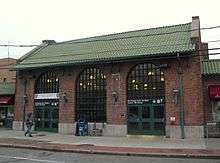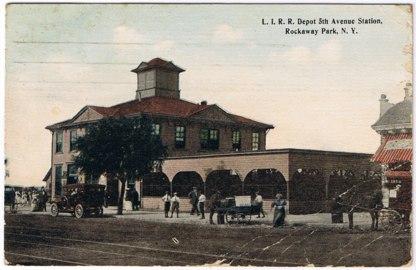Rockaway Park–Beach 116th Street (IND Rockaway Line)
| Rockaway Park–Beach 116th Street | |||||||||
|---|---|---|---|---|---|---|---|---|---|
| New York City Subway rapid transit station | |||||||||
|
| |||||||||
| Station statistics | |||||||||
| Address |
Beach 116th Street between Rockaway Beach Boulevard & Newport Avenue Queens, NY 11694 | ||||||||
| Borough | Queens | ||||||||
| Locale | Rockaway Park | ||||||||
| Coordinates | 40°34′51″N 73°50′10″W / 40.580725°N 73.83618°WCoordinates: 40°34′51″N 73°50′10″W / 40.580725°N 73.83618°W | ||||||||
| Division | B (IND, formerly LIRR Rockaway Beach Branch) | ||||||||
| Line | IND Rockaway Line | ||||||||
| Services |
A S | ||||||||
| Transit connections |
| ||||||||
| Structure | At-grade | ||||||||
| Platforms | 1 island platform | ||||||||
| Tracks | 2 (excludes 8 yard tracks adjacent to the station) | ||||||||
| Other information | |||||||||
| Opened | May 1882 (LIRR station) | ||||||||
| Rebuilt | June 28, 1956 (as a Subway station) | ||||||||
| Accessible |
| ||||||||
| Traffic | |||||||||
| Passengers (2015) |
255,542[1] | ||||||||
| Rank | 417 out of 422 | ||||||||
| Station succession | |||||||||
| Next north |
Beach 105th Street: A | ||||||||
| Next south |
(Terminal): A | ||||||||
|
| |||||||||
| Next |
Howard Beach–JFK Airport: A Far Rockaway–Mott Avenue (via Hammels Wye): no regular service | ||||||||
| Next |
none: A | ||||||||
| |||||||||
| |||||||||
Rockaway Park–Beach 116th Street is the western terminal station on the IND Rockaway Line of the New York City Subway, located on Beach 116th Street near Rockaway Beach Boulevard in Rockaway Beach, Queens. It is served by the Rockaway Park Shuttle at all times and ten daily rush-hour only A trains.
Station layout
| P Platform level |
Yard tracks | No passenger service |
| Track 2 | ||
| Island platform, doors will open on the left or right | ||
| Track 1 | ||
| Yard track | No passenger service | |
| G | Street level | Exits/Entrances |
| Station house | Lobby, fare control, station agent, police precinct | |

The station is at ground level. There are two tracks and an island platform. The tracks end at bumper blocks at the west (railroad south) end of the platform. Because the entrance is at street level, the station is ADA accessible without the use of an elevator or ramps.[2] On either side of the station are tracks leading to the Rockaway Park Yard. Originally, terminal tracks with low-level platforms occupied the yard area during the LIRR years.[3][4] The area of the current high-level platform was part of the LIRR depot yard.
The station house is made of concrete with windows and plywood walls and a brick exterior. It also has an entrance leading to an adjacent restaurant.[5] An examination of the station house shows the former ticket windows, which were used when the line was part of the LIRR. The station houses Transit Police District 23,[5] which was moved to the station in June 1977.[6] A new police facility was opened on September 18, 2009.[7][8][9][10] A NYCDOT municipal parking lot lies just north of the station.[5][11]
History
The station was originally built in 1882 as a Long Island Rail Road station on the Rockaway Beach Branch, was called Rockaway Beach, and contained a trolley stop for the Ocean Electric Railway, which eventually expanded their line further west to Belle Harbor and Neponsit. In 1899, the station was enlarged in order to accommodate the Brooklyn Rapid Transit Company cars, and the name was changed to Rockaway Park.
In spring 1917, a second station was built as a replacement for the former station, which was razed. After a 1950 fire at The Raunt destroyed the trestle across Jamaica Bay, the LIRR rerouted Rockaway Beach service along the Far Rockaway Branch, then abandoned the Rockaway Beach Branch.[3][4] The New York City Board of Transportation purchased all stations on the branch in June 1952, and the New York City Transit Authority (successor to the Board of Transportation) closed them to LIRR service on October 3, 1955 in order to convert many of them into subway stations.[3][4] The current station, Rockaway Park–Beach 116th Street, opened on June 28, 1956, with all other stations on the Rockaway Line except Far Rockaway.[12][13][14][15][16] Far Rockaway reopened in 1958 after being rebuilt for Subway use,[17] and the LIRR opened a new Far Rockaway station on Nameoke Street.[3] Plans to add a subway line to the Rockaway Peninsula actually date back to the 1920s and originally involved extending the western terminus along Newport Avenue to Beach 149th Street, rather than its current terminus at Rockaway Park.[18][19][20]
Starting in May 2007, the station building, platform and yard area underwent renovation. The new station building was unveiled in early November 2007.
Gallery
 Mezzanine and police precinct
Mezzanine and police precinct Postcard, ca. 1917
Postcard, ca. 1917 Platform reconstruction in 2007
Platform reconstruction in 2007 Northern half of the platform
Northern half of the platform
References
- ↑ "Facts and Figures: Annual Subway Ridership". Metropolitan Transportation Authority. Retrieved 2016-04-19.
- ↑ "NYC Official Accessibility Guide" (PDF). nyc.gov. City of New York. 2008. Retrieved 20 September 2015.
- 1 2 3 4 Linder, Bernard (February 2006). "Rockaway Line". New York Division Bulletin. Electric Railroader's Association. 49 (2): 3–4. Retrieved 27 August 2016.
- 1 2 3 "Fifty Years of Subway Service to the Rockaways". New York Division Bulletin. New York Division, Electric Railroaders' Association. 49 (6). June 2006. Retrieved August 31, 2016 – via Issu.
- 1 2 3 "SUBWAY-SIDEWALK INTERFACE PROJECT: ROCKAWAY PARK/BEACH 116TH STREET STATION" (PDF). transalt.org. Transportation Alternatives, City of New York, New York City Department of City Planning, New York City Department of Transportation. 2000. Retrieved 16 July 2016.
- ↑ "TA Police Shifting Dist. HQ To 116 St." (PDF). Wave of Long Island. Fultonhistory.com. May 18, 1977. Retrieved 16 July 2016.
- ↑ "City Officials Dedicate New Transit Police HQ at Beach 116". Metropolitan Transportation Authority. September 18, 2009. Retrieved 16 July 2016.
- ↑ "NYPD Officially Opens TD 23 Headquarters: HQ Situated Inside Beach 116 Street Subway Station". Wave of Long Island. September 18, 2009. Retrieved 16 July 2016.
- ↑ "Renovations Close Beach 116 Street Stores". Wave of Long Island. March 23, 2007. Retrieved 16 July 2016.
- ↑ Magoolaghan, Brian (March 15, 2003). "New Facility for Transit Bureau District 23". Wave of Long Island. Retrieved 16 July 2016.
- ↑ "Municipal Parking Facilities". New York City Department of Transportation.
- ↑ Freeman, Ira Henry (June 28, 1956). "Rockaway Trains to Operate Today". nytimes.com. The New York Times. Retrieved 29 June 2015.
- ↑ "First Train On Rockaway Line Runs This Afternoon" (PDF). Wave of Long Island. Fultonhistory.com. June 28, 1956. p. 1. Retrieved 16 August 2016.
- ↑ "First Train On Rockaway Line Runs This Afternoon" (PDF). Wave of Long Island. Fultonhistory.com. June 28, 1956. p. 6. Retrieved 16 August 2016.
- ↑ "TA's New Line To Rockaways Begins Today: Fifty Piece Band To Play as Special Train Makes First Run" (PDF). The Leader-Observer. Fultonhistory.com. June 28, 1956. p. 1. Retrieved 16 August 2016.
- ↑ "To Rockaways: Beach Trains In Operation" (PDF). Greenpoint Weekly Star. Fultonhistory.com. June 29, 1956. p. 2. Retrieved 16 August 2016.
- ↑ "New Subway Unit Ready: Far Rockaway IND Terminal Will Be Opened Today". nytimes.com. The New York Times. January 16, 1958. Retrieved 29 June 2015.
- ↑ Duffus, R.L. (September 22, 1929). "OUR GREAT SUBWAY NETWORK SPREADS WIDER; New Plans of Board of Transportation Involve the Building of More Than One Hundred Miles of Additional Rapid Transit Routes for New York". The New York Times. Retrieved August 19, 2015.
- ↑ Board of Transportation of the City of New York Engineering Department, Proposed Additional Rapid Transit Lines And Proposed Vehicular Tunnel, dated August 23, 1929
- ↑ Project for Expanded Rapid Transit Facilities, New York City Transit System, dated July 5, 1939.
External links
| Wikimedia Commons has media related to Rockaway Park – Beach 116th Street (IND Rockaway Line). |
- nycsubway.org – IND Rockaway: Rockaway Park/Beach 116th Street
- Station Reporter — Rockaway Park Shuttle
- Rockaway Park Station History (Arrt's Arrchives)
- The Subway Nut — Rockaway Park–Beach 116th Street Pictures
- MTA's Arts For Transit — Rockaway Park–Beach 116th Street (IND Rockaway Line)
- Beach 116th Street entrance from Google Maps Street View
- Platform from Google Maps Street View



